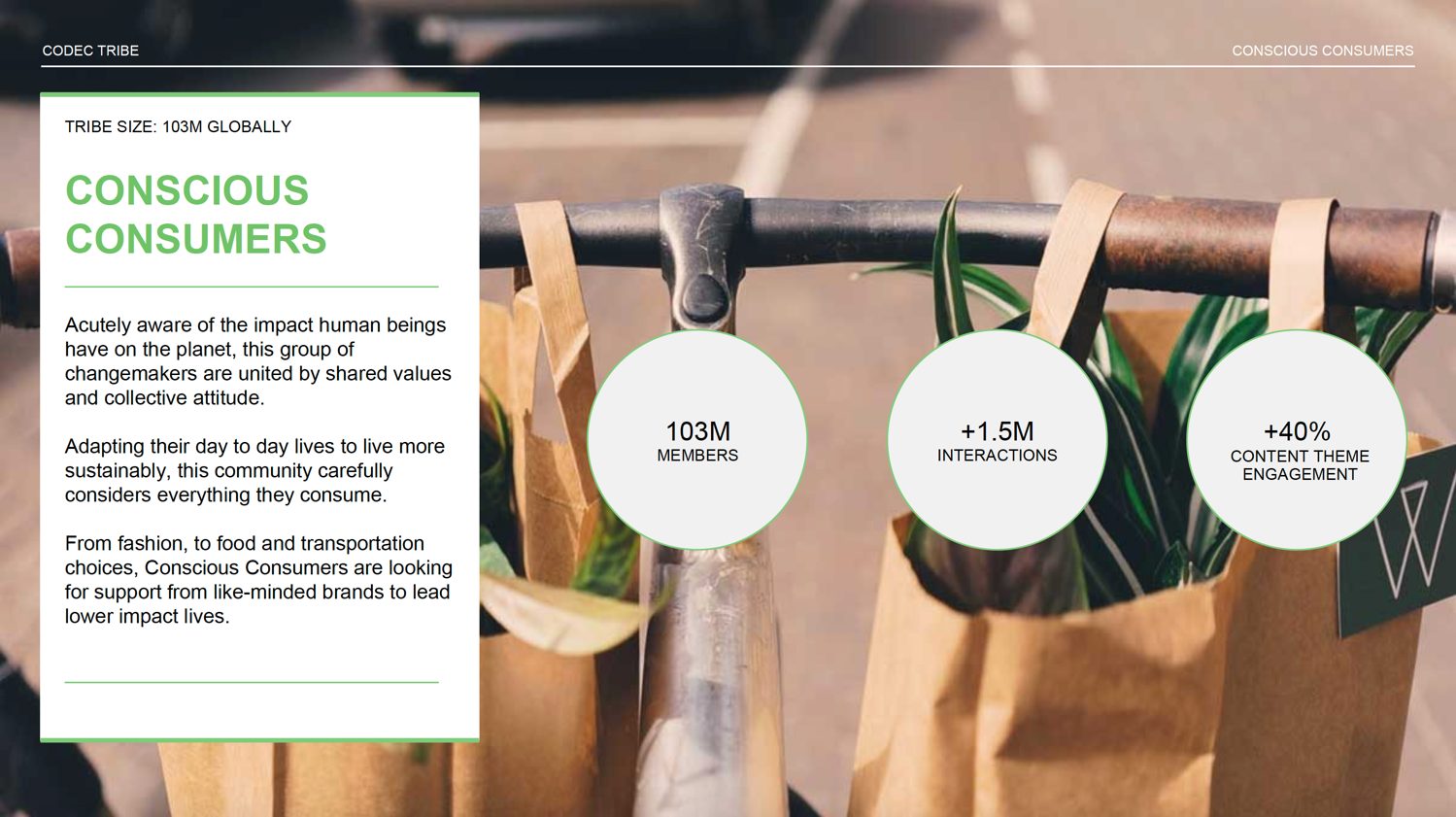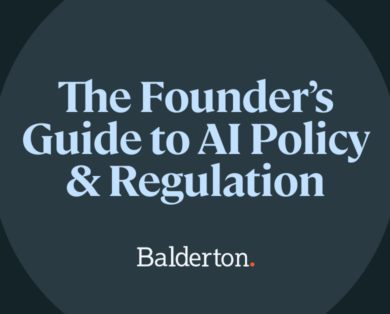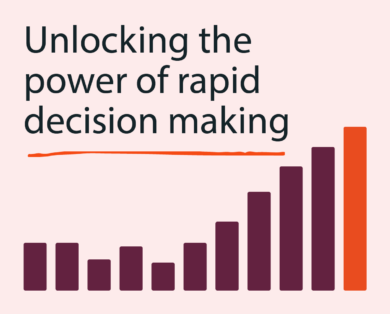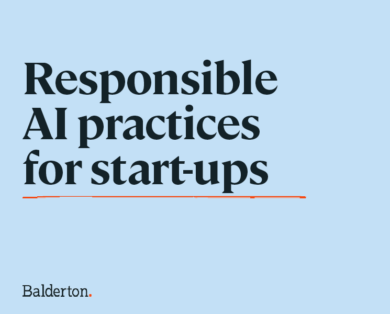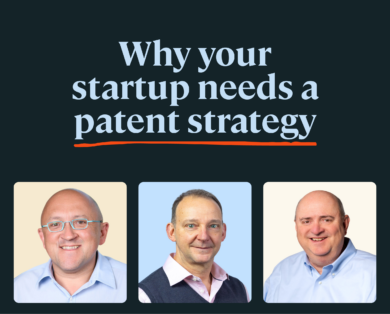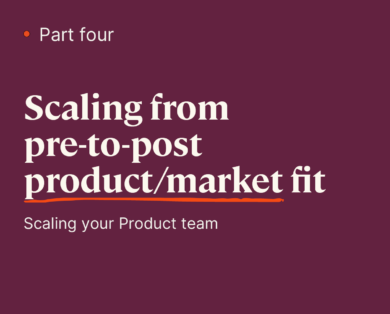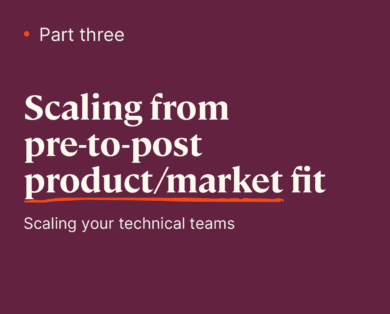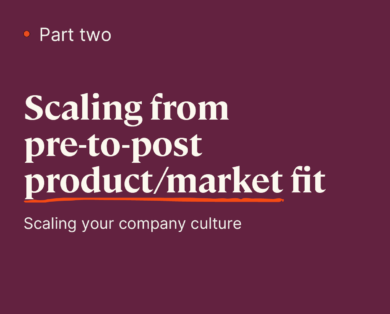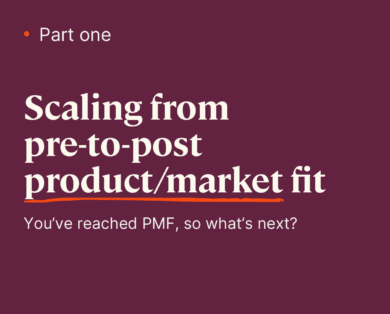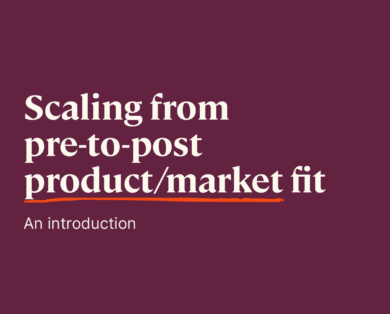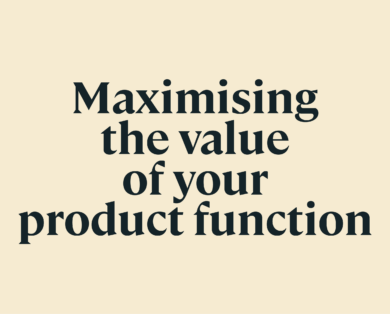- 09 April, 2025
BUILD
Workshop: Marketing through (& beyond) crisis
JUL 21, 2020

Share
As marketers, business owners, customers and as citizens, we’re facing a crisis in 2020. Larger than the 2000 dot.com crash, wider than the financial crisis of 2008, and one that comes on the heels of the Brexit uncertainty throughout 2019 (and earlier). So far, 2020 has really thumped us.
And no doubt we will be thoroughly thumped again with the inevitable follow-on global and local economic crises. Even those of us who have weathered many a storm agree these times are exceptional. But exceptional times can become exceptional opportunities to do what we do better.
Exceptional times can become exceptional opportunities to do what we do better.
Workshop: Marketing through (& beyond) crisis
To reach out to our portfolio and offer help, we recently invited senior team members from the Balderton portfolio to a workshop: Marketing through (& beyond) crisis.This was a private, invite-only workshop where teams could openly share and discuss the challenges they were facing. Our hope was that this forum enabled the difficult questions to get asked, and answered, thoughtfully, honestly and constructively.It’s often said that in a crisis, we revert to our ‘lizard brain,’ that ancient part of our brain responsible for fear and rage; fight and flight. The goal of this workshop was to give us space to zoom out and think about how to move forward as marketers – positively and proactively.
Our expert speakers
We were fortunate to have had this workshop spearheaded by three experts from TwentyFirstCenturyBrand who have led some of the world’s most iconic brands through periods of growth and challenge. This article outlines the key takeaways from the workshop, and shares frameworks that TwentyFirstCenturyBrand uses to guide their clients.Jonathan Mildenhall – Co-Founder TwentyFirstCenturyBrandJonathan is the former CMO of Airbnb and VP CocaCola

Neil Barrie – Co-Founder TwentyFirstCenturyBrand.Neil has led the development & growth of top tier brands including Airbnb, Pinterest, Netflix, Disney, N26, The Grammys and Unilever.

Jumoke Adekunle – Brand and Retail consultantJumoke has over 16 years experience in European and West African markets, both in the private and public sectors. She has led campaigns for global brands – Nike,Tommy Hillfiger, BBC 1xtra and Facebook.

This is a defining moment for brands
Today, the ‘traditional’ rules of marketing no longer apply. Instead, ‘new’ rules of marketing – ones that fully embrace empathy, transparency, generosity, trust and confidence – are more important than ever. This is a defining moment.The workshop proposed that how you build and manage a brand in a time of crisis is quite different from how you might do it when you are not faced with a wall of global pressures. The world won’t be returning to the way it was. And anyway, from a cultural and environmental standpoint, there’s a case to argue that it was broken anyway.Add to that, brands are considered, according to reliable consumer research, to be untrustworthy. Data from Edelman’s Trust Barometer cautions us that even in January 2020, before COVID and BLM came fully to the fore, distrust, driven by a growing sense of inequity and unfairness in the system, was at an all-time high. And in their more recent In Brands We Trust report of June 2020, Edelman found 81 percent of consumers say they must be able to trust the brand to do what is right; but that only 33 percent of respondents say they actually trust most of the brands they buy and use.So where do we start?
First, are you asking the right questions about your brand?
For some brands, recent crises have accelerated businesses and encouraged welcome transformation. For others, it’s been utterly catastrophic. In either case, how do you know if you have the right roadmap for the new future?The panel offered their unique perspective on what they see makes a successful and thriving brand in the 21st century – a perspective they recommend as a valid starting point for a brand ‘reset.’
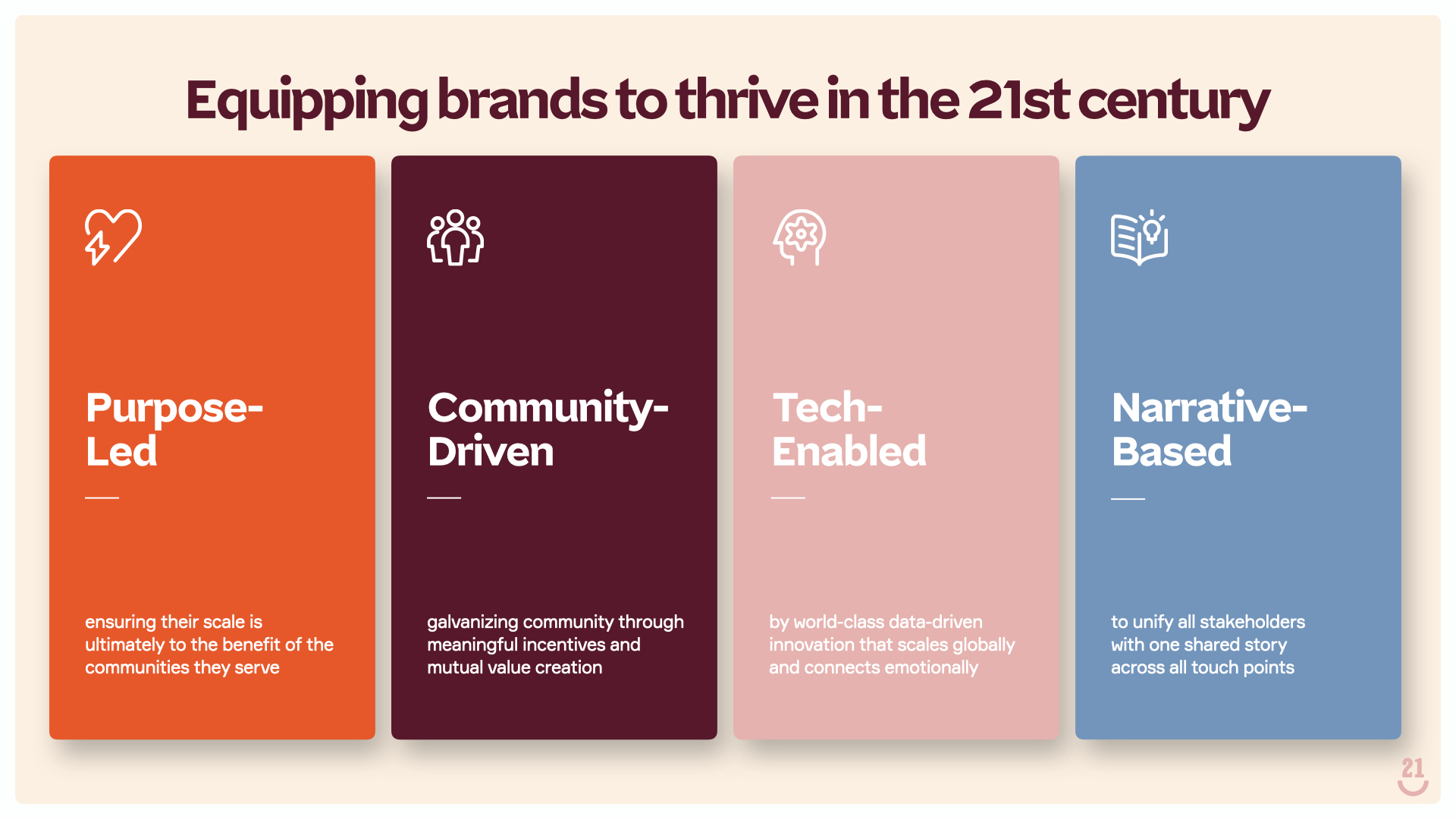
TwentyFirstCenturyBrand’s perspective on what makes a thriving brand in the 21st century
ARE YOU PURPOSE-LED?
Are you clear on your brand purpose? Are you creating value for everyone, from stakeholders, shareholders and employees to customers? Do people believe in you? Does your company actually matter? Is your purpose disconnected from, or connected to, your business plan?
ARE YOU COMMUNITY DRIVEN?
Are you committed to mutual value creation for your community? Are you listening to them? Are they helping you craft your company’s future? And are you committed to gaining the most value from that community in terms of their creativity, advocacy, engagement, and the power of their word of mouth?ARE YOU TECH-ENABLED?
Are you using technology in the right way to enhance the experience of your brand?ARE YOU NARRATIVE BASED?
Are you doing enough to tell the stories that resonate with all your stakeholders – customers, investors, employees? Can those stakeholders see themselves in your narrative? Is your story interesting to anyone beyond your four walls?Second, are you asking the right questions about your customers?
Based on in-depth research conducted by Codec.AI into today’s conscious consumers, TwentyFirstCenturyBrand advises three key questions in 2020:
- What do your consumers need right now?
- Who can you learn from? and
- What principles should guide your actions?
INVERTING MASLOW’S HIERARCHY
As ‘traditional’ marketers, we are taught to adhere to the consumer’s needs that appear at the top of Maslow’s hierarchy of needs – and focus on needs that are aspirational, self-actualizing, and centered on self-esteem.But you could say the absolute opposite is true now.The most urgent needs right now are those of security, safety and belonging. And this is true of both your customers and your employees.But this shouldn’t just result in vacuous “we’re all in this together” emails and tweets. Instead, it should prompt initiatives that show you have really spent the time needed to listen and understand how customers are being impacted, and how you can help address that impact.That’s the work that’s needed, even before a single tweet is shared, an email is written, or a pledge is made.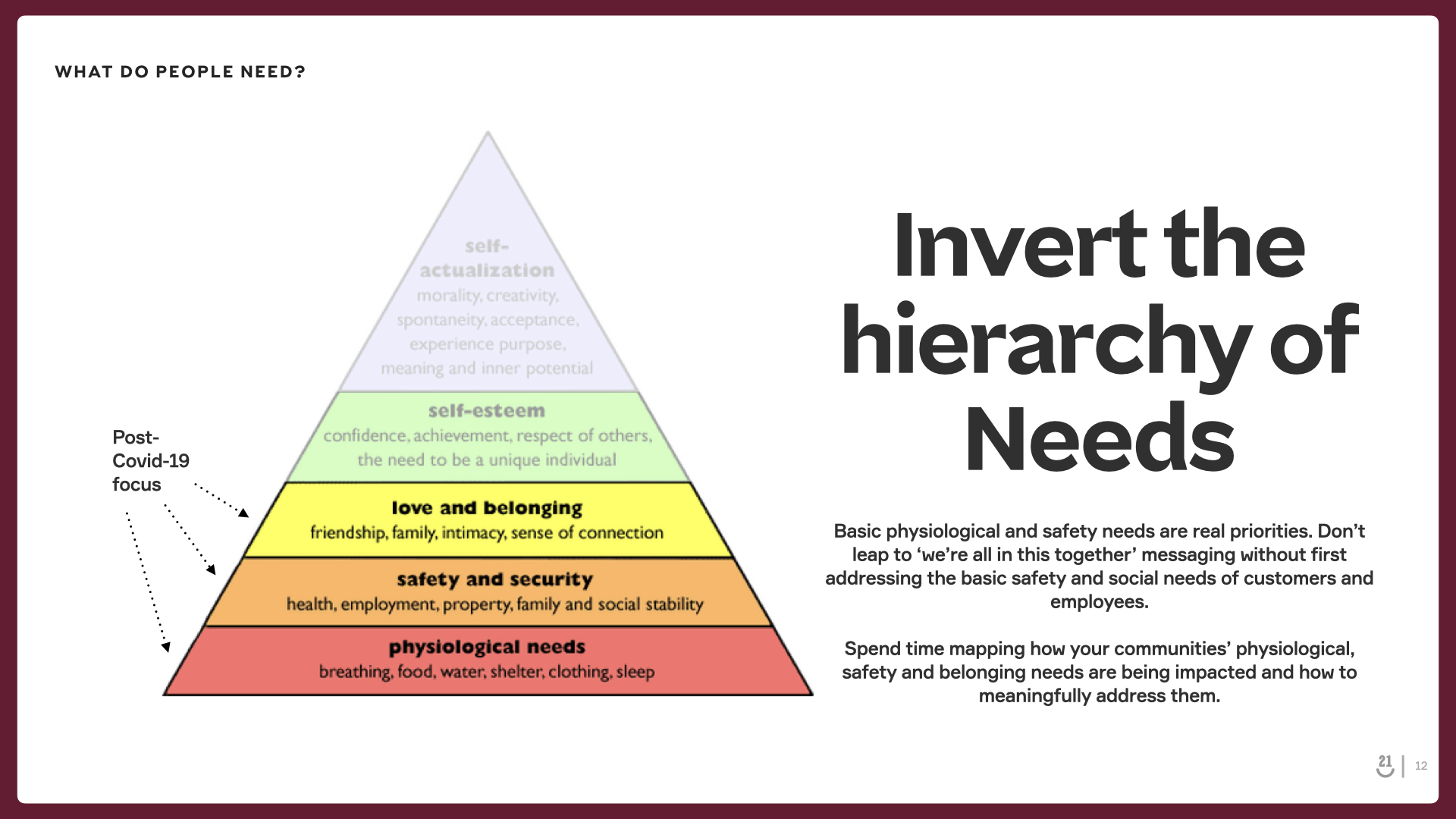
Invert Maslow’s hierarchy of needs
Six principles for marketing in a crisis
Once you’ve done the work of resetting and understanding where you are, the workshop offered a pragmatic framework to help guide actions for marketing in any crisis.
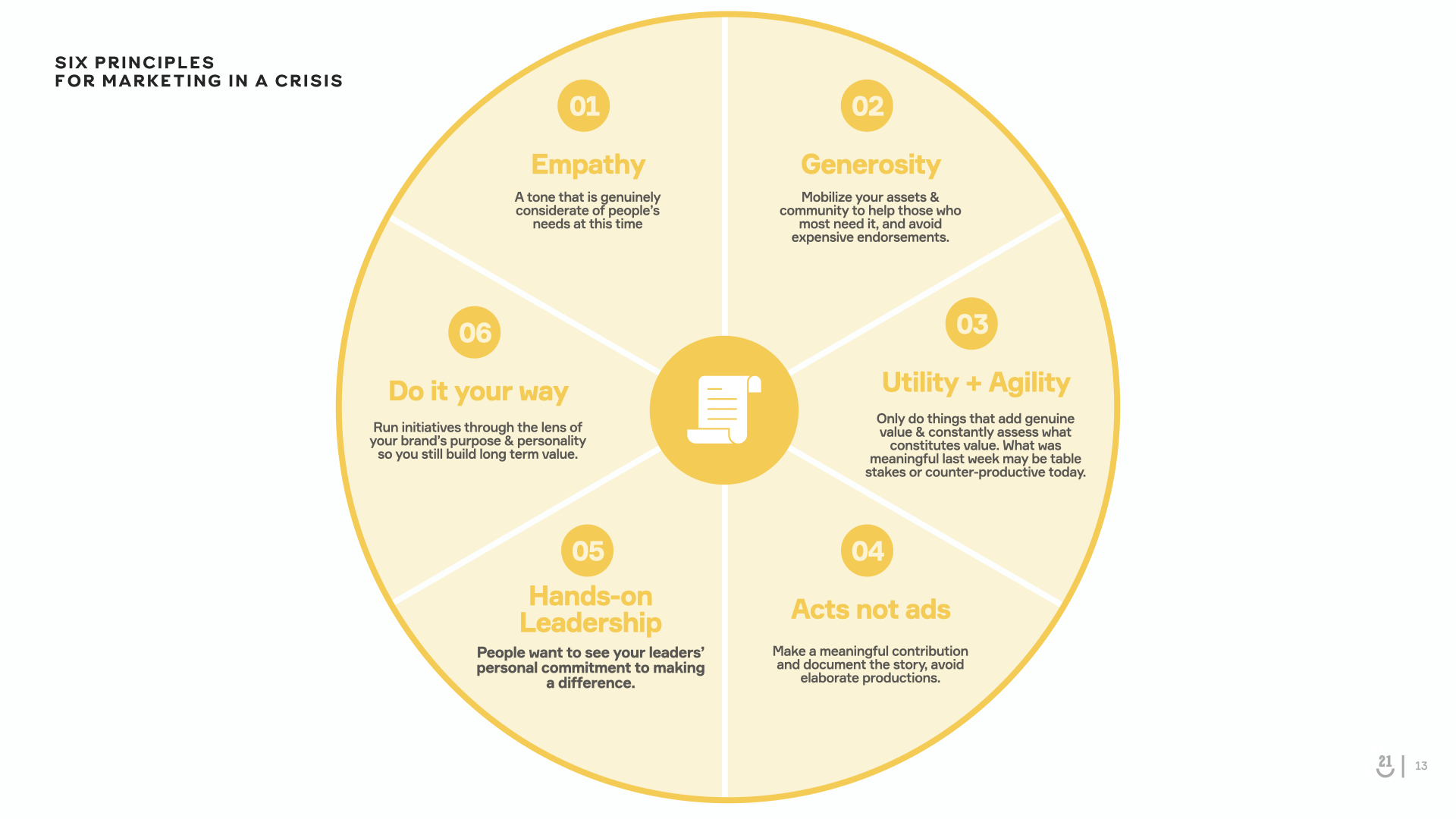
Six principles for marketing in a crisis. Source: TwentyFirstCenturyBrand
1.EMPATHY
Empathy – that’s always been a good place to start, and now it’s even more critical. (In fact, we recently led a workshop for our portfolio leaders on ‘Leading with empathy‘ at our 2020 virtual CEO retreat.)Are you adopting a tone, and actions, that are genuinely empathic to your customers?Are you regularly listening to diverse voices to understand their perspective?Are you being considerate of their needs, while acknowledging that in a crisis, your customer groups may well behave very differently than they would do in ‘normal’ times?By way of example, the workshop highlighted the work done in 2020 by portfolio company Depop, to commit to a journey of listening, learning and acting to actively embrace and endorse diversity, feature diverse sellers, and create meaningful commitments to those communities, and Depop’s own CMO Peter Semple joined the workshop to share his company’s journey to those commitments.
2.GENEROSITY
Instead of expensive endorsements, have you thought about how you can adopt strategic, and mass, generosity? The workshop highlighted the work that Headspace has done to give away their services to first responders, key workers and the newly unemployed, to help them deal with stress in their lives.3.UTILITY & AGILITY
Evaluate everything you do through the lens of utility. Is it really valuable? Does it make a real difference?4.ACTS, NOT ADS
There is a good role for communications out to the world, but think about how you can use that channel to communicate what you are doing with sustainable messages that are not simply ‘momentary,’ but that have lasting value. The workshop highlighted the highly action-focused work by P&G with their Take on Race initiatives.5.HANDS-ON LEADERSHIP
People do really want to see people in a leadership position make a commitment. In a time when people, companies and leaders can all feel quite vulnerable, if you’d done the homework of listening and understanding, the commitments you make will be all the more genuine and will win out in the end. By example, the workshop highlighted a letter, signed by 28 leading UK CEOs that commits to a comprehensive baseline of measurable, long term actions to accelerate black inclusion within their companies operating and hiring practices.6.DO IT YOUR WAY
Whatever you do, make it honestly fit who you are, and the purpose of your business. Don’t try to shoehorn yourself somewhere you don’t belong.We thank the team at TwentyFirstCenturyBrand for giving generously of their time to share their learnings, and to the terrific group of marketers and CEOs from our portfolio who joined us, and participated in the discussion.
For more information
Step through all the slides for this workshop event here.
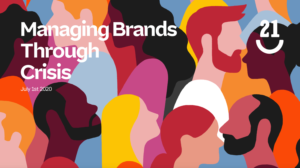
TwentyFirstCenturyBrand referenced research conducted by Codec.AI into today’s cohort of so-called Conscious Consumers. You can see the deck shared here. The deck summarizes their uniting characteristics; how COVID has intensified key themes; which brands have been engaging them successfully; and what tactics brands can look to employ to connect with this cohort.
